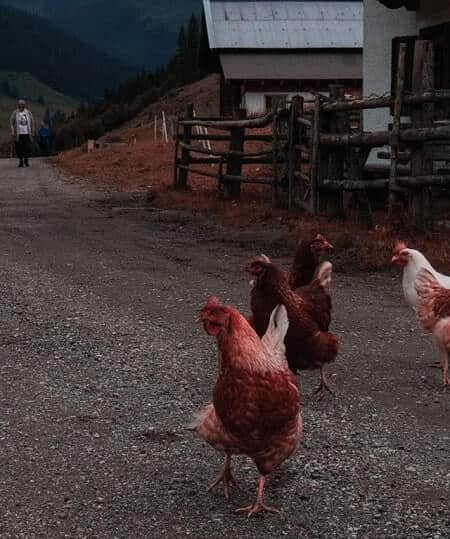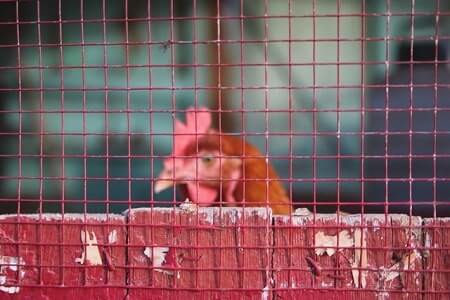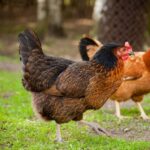Chickens are far removed from ducks and some other birds when it comes to being out in the rain and getting wet.
A lot of chickens will seek shelter when it’s raining, and it’s generally better for them if they do as they can get sick if they get too cold.
So, it’s up to you to make sure there are plenty of places to keep chickens dry in the rain should they need it.
Here is everything you need to know about the dangers associated with chickens getting wet, how to provide shelters, and more soggy chicken-related facts:
Table of Contents
Is It Ok for Chickens to Get Rained On?
Chickens can handle a little light rain, it’s not usually a big deal as long as it’s also not a bitterly cold day.
This does somewhat depend on the breed of the chicken, too. Some breeds, of which Silkies come to mind, are not harsh weather hardy - and they have all that fluffy fur that gets soggy too!
Generally speaking though, a little rain is not a problem. Most chickens will seek shelter if they feel the need to.
Related - If you’ve heard the rumor that chickens can drown in the rain < read this post!
The main concern is hypothermia. Chickens do get easily chilled, so if they’re out in the rain and it’s also windy or cold their core temperature will drop.
Combine this with wet feathers, and it can be potentially hazardous.
Why Do My Chickens Stay Out in the Rain?

Some chickens seem to love being out in the rain. I’ve seen it myself, and I hear it all the time from other chicken owners.
There is one huge benefit to being out in the rain; a little rain can bring out loads of different bugs and insects, giving chickens some new and exciting pretty to forage and scratch for.
And, although chickens bathe in dust, a little surface water on their plumage can’t be a bad thing!
It might also be due to what breeds you have or how old your chickens are. Some chickens just don’t seem to pay any attention to rain, much to their own detriment in some cases.
I always encourage my flock to seek cover when it’s raining any harder than a light shower. Their run has a simple corrugated roof, so I usually get them in there so they can still be outside.
Related - Does my chicken run need a roof?
Why Muddy Puddles in Their Run Is Bad
After rainfall comes muddy puddles. Despite not seeming like a big deal, muddy puddles can actually cause some problems for your flock.
You should try and do something about mud for a few reasons:
- Muddy puddles and still water are likely to contain bacteria, parasites, and possibly worse the longer they’re there. You don’t want your chickens drinking contaminated water.
- They won’t be able to take dust baths. Water finds its way to the lowest points, which is going to be where your chickens dug out a place to roll around and make a dust bath.
- They’re going to trek mud and dirt into their coop. They might not keep their coop in top condition, but it’s going to get worse a lot quicker with mud being trekked in.
- It’s known to be a cause of bumblefoot. Which is a bacterial infection and inflammatory reaction that affects their feet.
For these reasons, you should clear out muddy puddles after rainfall. It can become a bit of a chore, so you might want to create better shelter if you live in an area that experiences a lot of rainfall.
Related - How you can use Neem oil to treat parasites in chickens.
Think Shelter

It’s not hard to create a sheltered area your chooks can huddle together under when it’s raining.
As I’ve already mentioned, I’d pot a roof on their run for starters. You could also create a lean or some basic shelter with a few pieces of wood and a corrugated sheeting somewhere in your yard if your chickens roam free.
If your chickens seem perfectly happy in the rain and don’t look for shelter, round them up into their coop in heavy rain. It’s in their best interests.
In Summary
Some chickens love the rain, some hate it. Some breeds are cold weather and rain hardy, some aren’t.
It’s up to us as backyard chicken owners to take care of our feathered friends. I hate to say it, but chickens aren’t always the smartest when it comes to looking out for their best interests - that’s what we’re for!
All you can do is provide plenty of shelter for when it’s raining, and if they hang around when it’s cold wet round them up into their coop.
Resources
Image credits - Photos by Sophie Mikat, Ot van Lieshout, and Lesly Juarez on Unsplash




